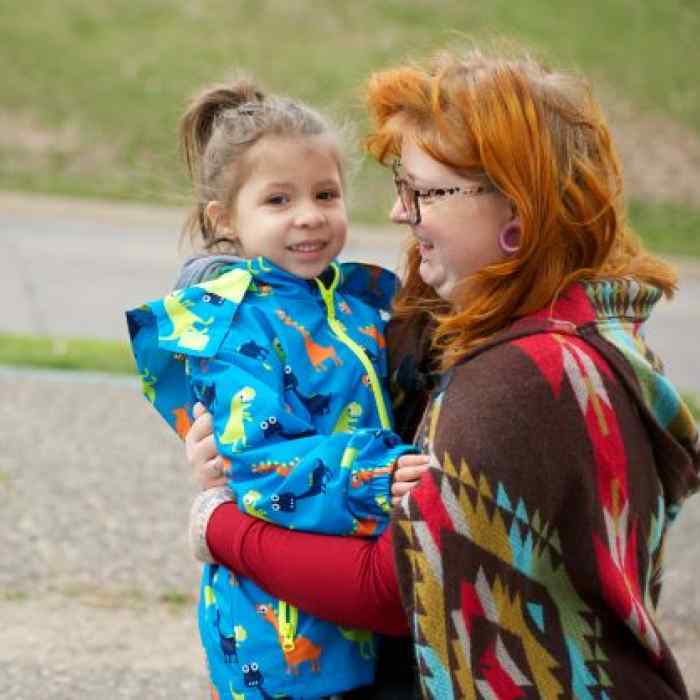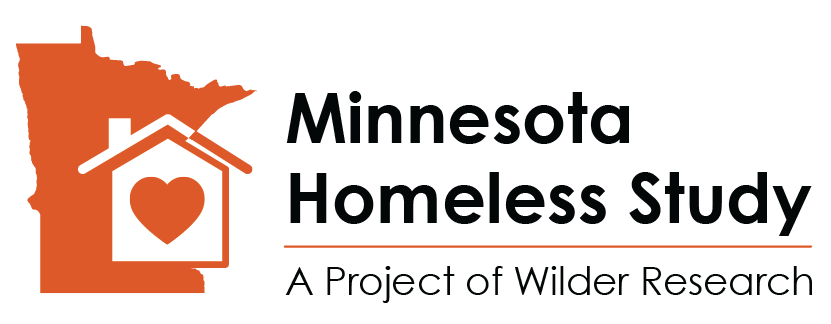Information for Service Providers
Information for Continuum of Care coordinators and service providers participating in the 2023 Minnesota Homeless Study
The data and analysis from the Minnesota Homeless Study provide advocates, program and service providers, funders, and policymakers the information they need to identify and address systemic issues, improve programs and policies, and ultimately eliminate homelessness.
Since 1991, the Minnesota Homeless Study has been conducted as a collaboration between Wilder Research, state and county agencies, CoCs, and hundreds of service providers across the state to better understand the prevalence of homelessness in Minnesota and the circumstances of people experiencing homelessness.
The most recent study took place on October 26, 2023. Results will be released beginning in March 2024.
The 2023 study was the first conducted since the COVID-19 pandemic began. It is more important than ever to shine a light on homelessness in Minnesota. Together, we will be better prepared to meet its challenges with clear and accurate information.
If you have questions, contact us at providers@mnhomeless.org.
☰On This Page
Do you work at a shelter, transitional housing, or outreach program?
All emergency shelters, transitional housing programs, and domestic violence shelters in Minnesota are included in the 2023 Minnesota Homeless Study!
- We work together to interview unaccompanied youth and adults/head of households who are: 1) staying in shelters; 2) staying in unsheltered locations; and 3) temporarily couch hopping and moving frequently
- Program staff or volunteers organized by Wilder conduct the interviews in person or by telephone
- Participants receive $10 for completing the interview
- Interviews take about 30 minutes to complete
2023 Minnesota Homeless Study timeline
What can Continuum of Care coordinators and providers expect in the months leading up to the October 26, 2023 study?
May-June 2023
Wilder, with support from ICA, identifies and contacts eligible emergency shelter and emergency shelter voucher programs, transitional housing, and domestic violence sites
- Wilder asks CoC coordinators to review site lists and provider contacts for accuracy. Wilder does initial outreach to individual providers through email.
June-July 2023
Wilder gathers and confirms participation details directly from all programs, also called sites
- Wilder gathers information such as how many people each site expects to serve on 10/26/23, whether they need support from Wilder to do interviews, information on best contact people at the program, etc.
August-September 2023
Wilder and others develop plans to interview people not in shelter
- CoCs, advocates, and Wilder will develop a plan to find and interview people not in shelter.
September-early October 2023
Wilder confirms program participation details
- Wilder confirms interview day logistics with shelter programs across Minnesota by phone and/or email.
- We work with CoCs and outreach staff to plan for interviews that will be conducted in non-shelter locations such as meal sites, drop-in centers, transit, and street outreach.
October 2023
Wilder sends out participation materials or prepares them for pick-up and may reach out to confirm final details
- Wilder sends participation materials such as surveys and incentives.
- If Wilder is supporting your site by providing interviewers, coordinating phone interviews, etc., we will do a final confirmation.
October 26, 2023: Conduct Minnesota Homeless Study interviews
Planning and conducting outreach interviews
Who is eligible for an outreach interview?
Unsheltered
- All single adults
- One adult per household
- All youth, ages 14-24, on their own (staying without their parents)
Couch-hopping
- All youth, ages 14-24, on their own (staying without their parents)
- Adults, age 25+, doubled-up and all things below are true:
- Their own minor children are with them
- They moved 2 or more times in last the 60 days
- They expect to be homeless or doubled up for an extended period of time
Other situations
People who would be eligible under the HEARTH Act, such as:
- People exiting an institution into homelessness
- People on your Coordinated Entry waiting list, if they qualify as homeless but are not yet in shelter or housing
- People who anticipate being evicted within 14 days
Note: If you are not sure if someone fits into the 3 criteria listed above, but you know they were not in shelter, do the interview with them.
Common outreach interview locations
- Drop-in centers
- Street and transit locations
- Encampments
- Meal sites such as Loaves and Fishes
- Project/Community Connect events
- Case worker or other service provider’s office
- Phone interviews with Wilder interviewers coordinated by McKinney-Vento School Liaisons
Who is NOT eligible for an outreach interview?
- Children and youth (age 24 and younger) who are staying with their parents.
- All people staying in shelter, domestic violence shelters, or transitional housing on October 26th.
They will be interviewed in those locations.
The role of outreach coordinators
To effectively reach the most people, each Continuum of Care region and organization serving people who are unsheltered and couch-hopping needs at least one outreach coordinator to support the organization and implementation of interviewing.
An outreach coordinator should:
- Receive the blank interviews and incentives. In the Twin Cities metro, the outreach coordinator picks up interviews and cash in person at Wilder Research in St. Paul (451 Lexington Parkway North, Saint Paul). In greater Minnesota, outreach coordinators are mailed a package containing blank interviews and a check. They are responsible for cashing the check for $10 bills for incentives.
- Return completed surveys and unused incentive money to Wilder Research.
- Coordinate with the outreach site about the best time to conduct interviews and where to do interviews at the site.
- Act as a point person at the outreach site on the survey date to answer questions from volunteers, pre-screen participants for general eligibility (for instance, ask if they are staying at shelter, and let them know they will be interviewed there), set up queuing system if there are too many respondents to interview immediately, distribute cash incentives, and secure completed surveys.
- Recruit and assign volunteers to outreach sites. Volunteers conducting outreach interviews should have some experience with people experiencing homelessness (note: with advance notice, Wilder can assist with interviewer recruitment).
- Communicate with Wilder Research about surveys, incentives, and planning support needs.
Phone interview option
Wilder has set up a toll-free number that can be used to connect with an interviewer at Wilder Research to schedule or conduct phone interviews, as needed, with eligible respondents.
This phone option requires more coordination and is best used when:
- There is a shortage of volunteer interviewers on-site
- There are concerns about geographic reach or safety issues
- There are cases in which people may be hard to locate on the day/week of the study but are responsive to phone contacts
The phone number is: 1-888-328-2972 (toll free) or 651-280-2800
To get the $10 incentive to respondents who complete a phone interview:
- If the phone interview was set up by an outreach coordinator, the coordinator can give the respondent the $10 after it is determined that the person completed the telephone interview.
- If the phone interview is ad hoc, or set up to call an isolated location where there are no outreach staff, Wilder can send a Visa gift card to the respondent or to an outreach worker or another service provider the respondent can easily access.
It is best if interviews are conducted IN PERSON with persons experiencing homelessness.
However, we do understand that in some circumstances, it is necessary to conduct them by phone. Remember these participants must be homeless on October 26th – even if they are interviewed 1 day before or 1 day after. Also, if they are staying in shelter on October 26th, they will be interviewed at that site (not interviewed by phone).
Frequently asked questions
Can we interview people who are staying in hotels/motels?
- Yes, if they are using the hotel as a temporary shelter (they do not have a permanent home), but are not receiving an official “shelter” voucher to stay there.
- REMINDER: Most vouchered motels are coordinated through the shelter component of the study, not the outreach component. Please contact Wilder Research if you have questions about vouchered motels in your area.
Can we interview people who are in treatment, detox, or jail?
- No, they cannot be interviewed if they are still IN detox or jail on the night of October 26, 2023.
- Yes, if they are leaving these facilities and WILL BE HOMELESS on October 26th.
Can we interview people who are about to be evicted from their housing?
- Yes, if they are going to be evicted in the next 14 days AND HAVE NO PLACE TO GO at that time.
Can we interview people in substandard housing?
- Yes, if it meets the definition of substandard: Lack of toilet or lack of electricity or lack of running water or lack of central heating or it has been condemned
Who should I contact with questions about outreach?
- For questions about outreach planning statewide, contact Monica Nilsson at monicanilsson2016@gmail.com or 612-239-4789
- For questions about outreach planning in Hennepin County, contact Greg Owen at greg.owen@wilder.org or 651-402-9968
Training options
Please email providers@wilder.org with names and contact information for anyone who will be conducting interviews as soon as possible prior to October 26th.
Each interviewer, whether a volunteer or staff, should complete interviewer training online or in person.
This includes:
- Watching three training videos
- Reading two documents about conducting social science research (A HIPAA (data privacy) form
- Practicing the interview a few times before October 26th
Find training materials and information about in-person training.
If we don’t have contact information and are unable to email the training materials, we ask that the person coordinating the interviewing share the training instructions they receive via email to all involved.
Responding to changing needs: 2023 study enhancements
Improve instrument to reduce burden on participants
- Wilder Research staff have carefully examined each question on the 2018 survey to match against the value of the information, contributions to trend lines and policy decisions, current relevance, and burden on respondent. Wilder Research staff eliminated about one quarter of the questions on the instrument and reworded or clarified a significant portion.
- A staff member with expertise in trauma-informed research reviewed the instrument and offered suggestions on wording. They will also help revise the training materials for interviewers. In addition, two open-ended questions were added to the end of the survey instrument to gather information about participant resiliency and strength.
- The Minnesota Tribal Housing Collaborative has reviewed the instrument and provided suggestions for the 2023 version.
- Members of the Hennepin County Lived Experience Advisory Group reviewed the instrument and provided input on new and existing questions and instructional language.
- Three Institutional Review Boards (IRBs) will review the survey instrument for approval.
Increase support for providers to implement the study, especially in greater Minnesota
- Wilder will promote a telephone interview option to providers as an alternative to having their own staff or volunteers interview in shelters. This may be especially useful to scattered site shelters, smaller shelters, and county office staff in regions outside of the metro area.
- Wilder will increase efforts to recruit interviewers for sites in greater Minnesota. In past studies, Wilder has matched volunteer interviewers to sites in Duluth and central Minnesota, as well as on several reservations.
Improve value and utilization of information by CoC regions
- Currently, Wilder provides counts reports and detailed data tables for every question on the survey for each CoC region, as well as greater Minnesota versus metro regions. In addition, Wilder has initiated data-informed decision-making workshops for providers, policymakers, funders, and CoC coordinators to understand the depth of information available. Over 200 people attended workshops in 2019. Wilder will increase these types of “data parties” after the 2023 study.
- Because there has been significant staffing turnover leading to decreased familiarity with the data as well as a need to increase ease of access to information, Wilder will seek funding to produce region-specific fact sheets, similar to those prepared for Ramsey and Hennepin counties in previous years.
- Wilder is available to attend CoC meetings to promote the study and/or give findings when they are available.
Continue to leverage HMIS data
- Most shelter providers will no longer need to provide survey day counts by gender, age group, and family status. The HMIS Governing Board has approved Wilder Research working with ICA staff to use HMIS shelter counts data to supplement the interview data. The shelter counts are used for the counts reports and trends (in addition to those counted in unsheltered and non-HMIS locations) and for survey weighting.
- Wilder has also had extensive conversations with state, CoC, provider, and ICA staff about aligning the Minnesota Homeless Study with the PIT count. Ultimately, ICA decided that the timing for 2023 was not feasible, but conversations continue. In 2023, Wilder and Hennepin County partnered to plan and implement their PIT count.
Better communicate how the Minnesota Homeless Study and the Reservation Homeless Study results are used to serve people with housing instability
- Extensive media and advocacy attention caused by the release of the Single Night Count of People Experiencing Homelessness Fact Sheet led to the governor increasing his budget for housing and homelessness services.
- A “Twitterstorm” related to the release of the 2018 fact sheet on the characteristics of people experiencing homelessness led to passage of bill through legislative committee hearings.
- A Minnesota Housing data-informed decision-making workshop focused on population-specific responses to unsheltered homelessness.
- Tribal advocates used Minneapolis encampment data to secure funding.
- Metro Transit requested a special analysis of people who use transit for shelter to better design responses, including case management, to assist people with multiple needs, especially when planning for Green Line night-time closures.
- At the start of the pandemic, the state requested a special analysis to understand more about the needs of people most at risk of COVID-19 to include with their FEMA application.
- Wilder worked with Minnesota Housing and the Minnesota Department of Health to conduct a special analysis for a grant specific to pregnant women.
- The Office of Economic Opportunity used data in a legislative report on youth experiencing homelessness in an effort to promote system improvements.
- State agencies used data to inform several specific legislative requests, including those that provide credits for youth.
- Several private foundations have requested and used data for planning. Examples include understanding the number of housing units needed to eliminate racial disparities in homelessness in the Twin Cities and understanding the bi-directional flow of people experiencing homelessness between greater Minnesota and the metro area.
- City of Minneapolis staff recently used data to inform development of city-level emergency plans and resource allocations for unsheltered persons.
- Providers and grant managers regularly request and use study data when seeking funding.
In recent years, data from the study has guided our leadership’s strategic decision-making about where to expand programs and services, informed our agency response to the COVID pandemic, and shaped our multi-year campaign to develop more trauma-informed, health-focused programs for homeless individuals of all ages.


